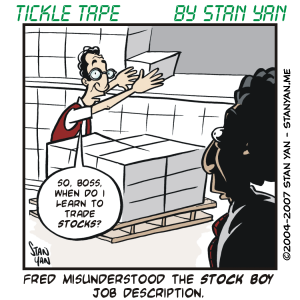“How many novice traders succeed?” asks a would-be trader of a group of seasoned experts. “Of the 40% who last about a year, only one or two become consistently profitable,” answers the head of a major brokerage. “About five out of 100 is what I’ve found,” remarks a top trader at a leading hedge fund. At Innerworth, we’ve found that less than 25% last about six months. There seems to be a wide consensus: If your plan is to become a full-time trader, the odds are against you. So one thing that you don’t want to do is make the odds even lower. Here are a few of the ways that newbie traders can avoid common mistakes and beat the odds.
Control Overconfidence: You’ve got to be optimistic. A pessimist could never face the dismal odds of success. But you must use your optimism effectively. Don’t arrogantly think you know how to trade before you’ve built up the necessary skills. Study, practice, and learn. Set learning goals, rather than performance goals. In other words, reward yourself for learning techniques at first, and when you’re ready, you can set an overall profit goal.
Admit You’re Gambling and Limit Risk: Stockbrokers and other members of the investment community think they derogate traders by calling them “gamblers,” but seasoned traders just admit it: “We’re gambling,” they freely say. Hey, there’s risk involved and you better admit it. Traders are going for big profits, and they are ready to take responsibility. However, the difference between the professionals and the amateurs, whether trading or gambling, is that risk is carefully managed.
Since you’re trying to capitalize on winning odds, it’s vital for your survival to anticipate a string of losing trades. That means looking at the risk to reward ratio before entering a trade, making sure that you’ve got a large enough account to take the risk, and if you don’t, stand aside and wait for a trade you can take. Risk management is a trader’s secret weapon.
Use Sound Trading Strategies, and Know When to Move On: This is so much easier said than done. Obviously, you can’t expect to profit if your trading strategy is flawed. But the hard part is knowing when it’s flawed or just not working because of less than optimal market conditions for that strategy. All the trading books and experts warn, “Don’t abandon a trading strategy prematurely.”
It’s not wise to jump from strategy to strategy, but what’s “prematurely”? Based on probability theory, even a winning strategy can produce a string of losers and a severe drawdown, so sticking with a sound strategy too long when it’s not working is going to wipe out your trading account. So we’re all walking a fine line. Perhaps the best you can do is decide how much of your trading capital you will risk on the strategy upfront, and if you lose that predetermined stake, just move on.
Also, acknowledge the complexity of the markets. Know the market conditions that are necessary for the strategy to work, and make sure those conditions are present. But in the end, there’s no substitute for trading experience in terms of knowing how long to stick with a trading strategy before abandoning it.


